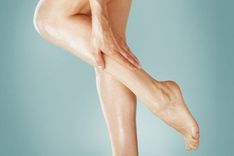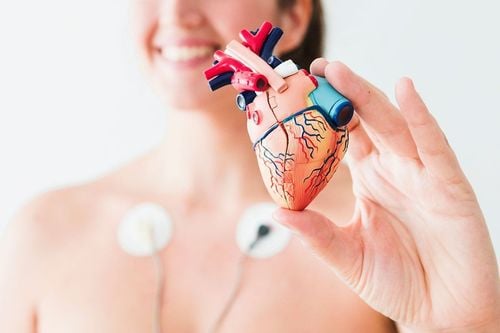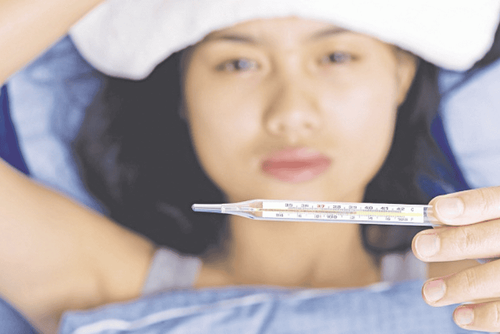Frequent night sweats in adults can be a sign of serious medical conditions. See your doctor to rule out the cause and get timely treatment.
1. Common Causes of Night Sweats
Night sweats in adults are often associated with some of the following common causes:
1.1. Anxiety or Stress
Adult night sweats often occur when experiencing anxiety or stress. Sweating is often more common during the day when anxiety occurs.
Symptoms of anxiety and stress manifest differently from person to person. Other signs that you may be anxious or under a lot of stress include: persistent anxiety, fear, and stress; difficulty concentrating; attempts to avoid the source of anxiety or stress; feelings of fear; inexplicable fears; trouble sleeping; a weak immune system; nightmares; soreness; stomach problems; rapid breathing and heart rate; irritability; weakness or fatigue; dizziness, and shaking.
If left untreated, stress and anxiety, or depression, can have a big impact on everyday life. See your doctor to identify the source of your anxiety and improve your symptoms.
1.2. Gastroesophageal Reflux Disease (GERD)
Night sweats in adults have been linked to gastroesophageal reflux disease, which occurs when the muscles that relax the esophagus do not work properly, allowing stomach acid to back up into the esophagus, causing heartburn. If the symptoms below occur more than once a week, you may have GERD. GERD can occur during the day or at night.
Symptoms of GERD include: heartburn; chest pain; difficulty swallowing; food reflux; cough, asthma symptoms, or other breathing problems (usually due to reflux at night); difficulty sleeping.
Night sweats in adults that occur frequently, disrupt sleep, or require heartburn relief at least 1–2 times a week should be seen by a doctor.
1.1. Anxiety or stress

1.3. Hyperhidrosis
Idiopathic hyperhidrosis is excessive sweating without a specific cause. Meanwhile, secondary hyperhidrosis has a specific cause, such as a medical condition or medication.
Hyperhidrosis can cause: excessive sweating that seeps through layers of clothing; sweating during the day, and also night sweats; perspiration on the feet, soles, hands, face, or armpits; sweating in one or more areas; sweating on both sides of the body. If hyperhidrosis is affecting sleep or quality of life, seek timely medical advice for treatment.
1.4. Medication
Some drugs can cause night sweats as a side effect in adults, for example:
SSRIs and tricyclic antidepressants; cortisone and prednisone; acetaminophen (Tylenol), aspirin, and other pain relievers; antipsychotics; diabetes medications; hormone medications. If your night sweats are related to your medication, see your doctor for an alternative prescription or methods to deal with night sweats, especially when it interferes with your sleep and negatively impacts your daily activities.
Some medications cause night sweats in adults.

2. Less common causes
If the cause of your night sweats is not in the items above, you can refer to some less common causes such as:
2.1. Low Testosterone
Night sweats can occur when testosterone levels in the body are low. Testosterone is secreted less with age, injury, medication, illness, and substance abuse.
Other symptoms of low testosterone may include: muscle weakness, fatigue, less interest in sex, erectile dysfunction, decreased bone mass, difficulty concentrating and remembering, and mood changes, including depression or low mood and irritability. See your doctor right away for advice on testosterone replacement therapy, which is used to increase testosterone levels in the body when uncomfortable symptoms appear.
2.2. Other hormone problems
Hormonal disorders that can cause night sweats include: hyperthyroidism, carcinoid syndrome, and adrenal neoplasms. Along with night sweats, some common symptoms of these conditions include: increased heart rate, shortness of breath, tremors, diarrhea, headache or stomach pain, sleep problems, and anxiety, nervousness, or other mood changes. If increased sweating or any of these symptoms occur, see your doctor to rule out hormonal problems.
2.3. Sleep apnea
Night sweats can be a sign of sleep apnea. With this condition, you can have several episodes of sleep apnea in one night. It is more common in men, with about 25% of men having it.
In addition to night sweats, sleep apnea also causes the following problems: snoring, feeling very tired during the day, waking often at night, waking up choking or gasping, throat irritation when waking up, difficulty concentrating, and symptoms of anxiety, depression, or irritability. Because symptoms of sleep apnea can increase your risk of other health problems, see a sleep specialist to rule out this condition.
2.4. Infection
Infections can also cause night sweats. The severity of the illness can vary from a mild viral infection with a low-grade fever to a serious infection that can be life-threatening.
Some serious infections can include: tuberculosis (a bacterial infection), endocarditis (usually bacterial and involves the heart), osteomyelitis (usually bacterial and involves the bones), and brucellosis (a bacterial infection). Some general signs of infection to look out for include: fever and chills, muscle and joint aches, fatigue and weakness, decreased appetite and weight loss, and redness, swelling, and pain at a specific site. You should seek medical attention as soon as possible if these symptoms worsen, do not improve after a few days, or if you suddenly develop a high fever.

3. Rare causes
In rare cases, night sweats can occur as a symptom of cancer or certain neurological diseases, including stroke.
3.1. Neurological diseases
Neurological diseases involving the nervous system, such as the brain, spinal cord, and nerves, can be a rare cause of night sweats. In general, symptoms of neurological conditions include stroke, syringomyelia, autonomic dysreflexia, and autonomic neuropathy. Symptoms of neurological problems can vary widely. Along with night sweats, you may also experience numbness, tingling, or weakness in the hands, feet, and extremities; decreased appetite; pain and stiffness throughout the body; and dizziness or fainting. Call 911 if you suddenly are unable to speak; have blurred or lost vision; are paralyzed in one limb; have sagging on one side of the face; or have a severe headache. These are signs of a stroke (cerebrovascular disease), which can be life-threatening. Your chances of recovery increase with immediate medical attention.
3.2 Cancer
Night sweats can be a sign of cancer, but this is very rare. Remember that cancer is often associated with other symptoms, such as persistent fever and weight loss. These symptoms can vary and may occur sooner or later, depending on the type and severity of the cancer.
Leukemia and lymphoma (Hodgkin or non-Hodgkin) are the two most common cancers that can present with night sweats. In addition, they cause other symptoms such as extreme fatigue or weakness; unexplained weight loss; chills and fever; swollen lymph nodes; bone pain; and chest or abdominal pain. Early signs of cancer can be ignored because they are less serious and easily confused with other conditions. If you have frequent night sweats, feel very tired and weak, or have flu-like symptoms that don't improve, it is best to see your doctor for a checkup.
4. When to see a doctor?
If you experience night sweats, you can try to manage the sweating by reducing the temperature in your bedroom, sleeping with fewer blankets, and avoiding hot drinks and spicy foods before bed.
If these changes don't help and you continue to sweat at night, see your doctor, especially if you experience occasional episodes of night sweats more than once; a fever that won't go away; recent weight loss without trying; feeling tired or unwell; or insufficient sleep due to night sweats. There are many causes of night sweats in men, so when the condition persists, patients should promptly seek medical attention for examination and treatment.
With many years of experience in the examination and treatment of diseases, Vinmec International General Hospital has become a major healthcare center, capable of examining, screening, and treating many serious diseases. Therefore, if you experience prolonged, abnormal night sweats, you should go to Vinmec International General Hospital for examination and advice from doctors and health experts.
To arrange an appointment, please call HOTLINE or make your reservation directly HERE. You may also download the MyVinmec app to schedule appointments faster and manage your reservations more conveniently.
Reference source: healthline.com













